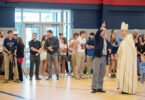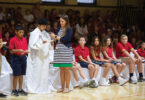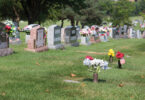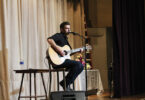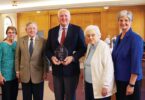Topeka parishioner prays for Japanese relatives
by Joe Bollig
joe.bollig@theleaven.org
KANSAS CITY, Kan. — They knew it was coming, the “Big One.”
Yoshi Gerner’s relatives in Japan had known it for days.
Japan experienced a 7.2 earthquake on March 8, and Gerner called relatives in Tokyo and Sendai, northeastern Japan, to see how they fared.
“They were saying [they] were supposed to have a big one coming, but they didn’t know when,” said Gerner, a member of Most Pure Heart of Mary Parish in Topeka. “They knew it was coming for a long time.” Just three days later, on March 11, it hit.
At 2:46 p.m., a 9.0 megathrust earthquake erupted about 80 miles east of Sendai in the ocean, where the Pacific and Asia tectonic plates meet. The shaking was followed by an enormous tidal wave – a tsunami — that surged over sea walls and poured inland, far along the coast of northeast Japan.
Gerner’s sister in California was on the phone with the sister in Tokyo when the line suddenly went dead. It was an ominous development, and the reason for it only became clear when early news reports hit the media outlets.
As the hours passed, subsequent news bulletins began to paint a canvas of terror, horror, destruction and death.
“The first 48 hours I couldn’t get through,” said Gerner. “I almost went crazy.”
Yoshi Gerner was born in Sendai. Her family moved to Manchuria, part of China, during World War II. They returned when the war was over. She married Frank Gerner, an American, 40 years ago and they moved to Topeka. But she still has relatives in Fukushima, an inland city approximately 25 miles west of the nuclear power plants near Soma on the coast; in Tokyo, to the south of Sendai; in Sendai, a city on the coast with a population of one million; and in Shichigahama, a town on a peninsula northeast of Sendai. Many of her cousins live in other places along the coast of Miyagi Prefecture.
Gerner has been glued to her television since the March 11 earthquake and tsunami, and her husband has been scanning the Internet for information. The Gerners also get news from the Japanese national public broadcasting company, NHK, via a satellite channel.
Details of how family members have fared have come through telephone calls, as service is gradually restored. As of March 15, 14 members of Gerner’s immediate family have been accounted for.
The earthquake and tsunami did not destroy all of Sendai. The house in which Gerner grew up survived the shaking and tsunami, although the contents flew all over the interior. It still has water and electrical power. Otherwise, power availability in the city is very spotty.
Her elderly brother-in-law (Gerner’s sister is being treated for cancer at a Sendai hospital) rode out the disaster alone.
“He said it was just like being in a ship in a storm,” said Gerner. “He was shaking so he couldn’t stand. He had to hold onto a post. Most Japanese houses have a post.”
By and large, the brother-in-law has been forced to fend for himself.
“A funny thing about Japanese men,” said Gerner. “My sister is in the hospital, so he has been living by himself. My niece would bring him food, and he would go out to eat.”
“But since my niece does not come, he has no food,” Gerner continued. “He said he was not eating anything, so he went out. He couldn’t find any stores. He went 20 miles from home and finally found one store open. He said, ‘Guess what I found? Cup of noodles.’ Japanese men don’t cook. My brother-in-law is typical. I said, ‘Do you know how to make it? Just put in hot water,’ and he said, ‘I can do that.’
“So yesterday I called him and asked, ‘Do you have rice and soy sauce?’ He said yes. ‘Then cook the rice and put soy sauce on it and eat.’ He said, ‘I don’t know how to cook rice.’ We laughed together.”
The missing niece and her family were eventually found at a refugee center set up at a school. They were later able to return to their own home, which was still intact. A nephew, who was also safe, had to walk 10 miles to find drinkable water, however. He found his wife’s parents at another house with friends.
No word has been received about the fate of Gerner’s relatives from her mother’s side of the family in Arahama and Shichigahama, both on the coast. A cousin’s family that lived next to Sendai Airport, which is on the coast, is also unaccounted for.
Gerner’s sister in Tokyo said on March 14 that things were slowly getting back to normal, but there were concerns about the failing nuclear power plants to the north. Gerner isn’t too worried about her brother-in-law in Fukushima (who is sheltering guests from Soma) getting a dose of radiation. The winds tend to blow out to sea in that area.
“[The Japanese] are very, very good,” said Gerner. “They are a very organized people. We have no looting. Nobody steals anything from an empty house. If I saw that, I’d be very surprised. We are not that kind of people. Do you know why? Because we were beaten up by the war. [We Japanese] know what to do, and how to help each other.”
Likewise, Gerner has experienced an outpouring of concern from her neighbors, her fellow parishioners, pastor Father Brian Schieber and associate pastor Father Shawn Tunink, and even total strangers. Some have sent her emails from out of state.
“I’m really amazed how people are,” she said. “I appreciate it. I feel I need to do something, but I don’t know. Every time I think about it, tears come out. I’ve been crying . . .”
She has been doing the only thing she can — praying constantly.
“I called the Red Cross,” she said. “I asked them if I could be a volunteer to go to Japan, if I could do something. But then I forget my age — I’m 77. What can I do? Maybe I can translate.”
She hopes Sendai can be rebuilt. After all, she’s seen that happen before.
“But that was 60 years ago,” said Gerner. “Today’s people may not be as strong.
“I only hope they are.”

